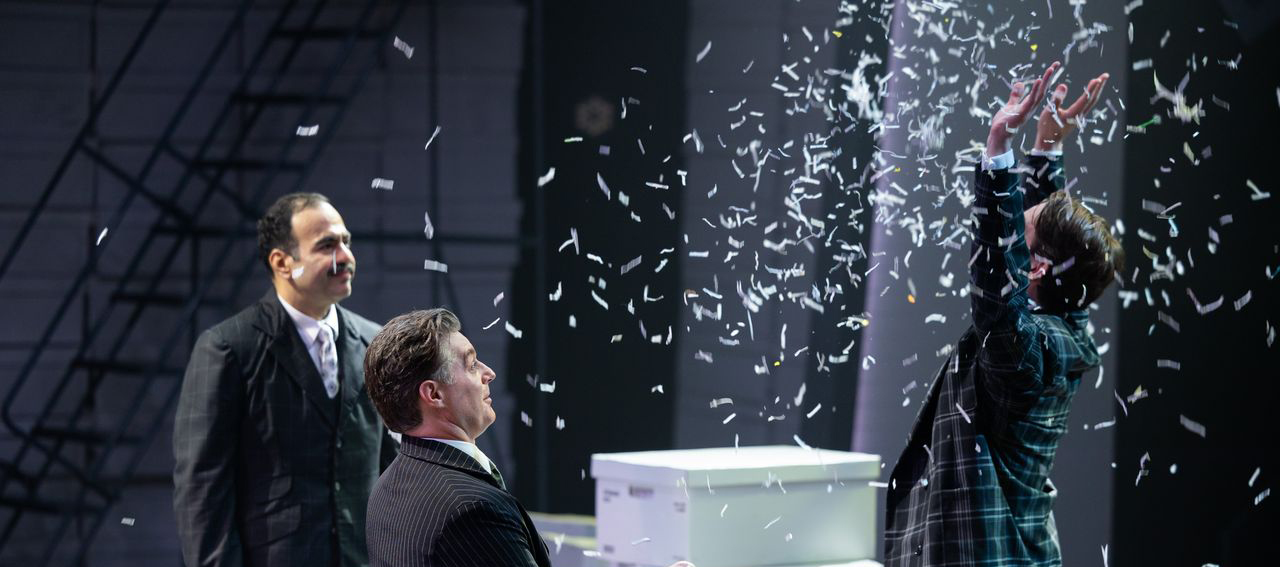Derek Charles Livingston took his place as Stages artistic director a little over a year ago, but he lost little time immersing himself in Houston life and its theater community. He moved into the historic Third Ward, attended Astros games, judged a Writers in the Schools poetry slam, and above all began exploring the Houston art scene. In fact, I’d spotted him in the audience at several other theaters across the city long before I stopped by a rehearsal of the Stages fall opener, The Lehman Trilogy, to ask him about his first year at the helm and what’s to come.
“I think you have to recognize, acknowledge, and honor the things that have been important to them while giving them a chance to see new works or different types of works, from that artistic director’s perspective, that will expand their view of the theater.”
Livingston compared a theater company with an art museum and a theater’s regular audience with museum members. That art lover likely knows the collection well, but will also be excited to see new curated exhibitions. Keeping with that analogy, we discussed some of the upcoming shows that fit into the Stages “collection,” the type of productions that subscribers have come to know and love from the company, as well as those shows reflecting Livingston’s expansive perspective.
Stages will continue its long-running collaboration with actor and playwright Denise Fennell, bringing back her one-woman show The Bride in early 2026. The company also maintains holiday traditions, offering the comic and irreverent, The 12 Dates of Christmas and the more family-friendly It’s a Wonderful Life: A Live Radio Play. Watching the classic film is one of Livingston’s own annual rituals, so this was an easy choice for the lineup and one he’ll direct. As a radio play, he wants to create both a “sonic” experience for the audiences but also plans to stage it “in a way that the actors still have dynamic movement, and we see interaction among them that tells the story.”
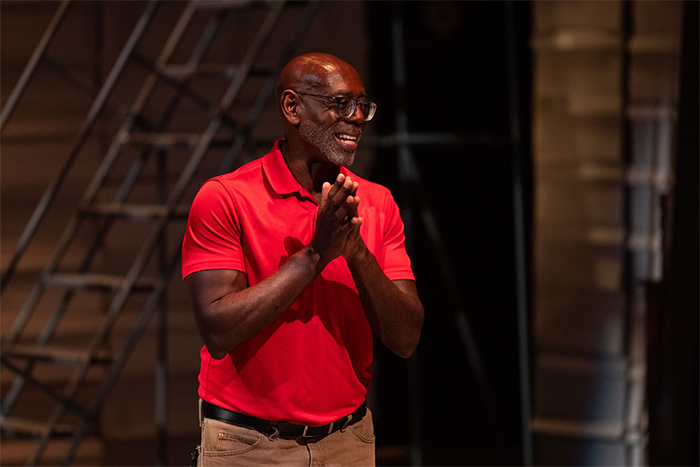
1 ⁄4
Stages Artistic Director Derek Charles Livingston. Photo by Melissa Taylor.
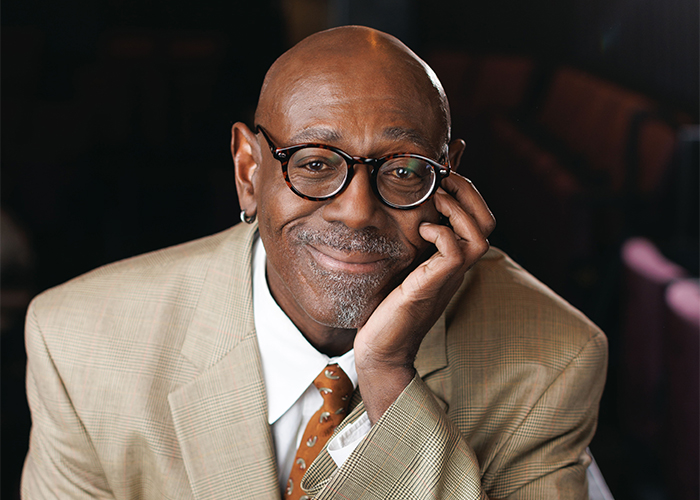
2 ⁄4
Stages Artistic Director Derek Charles Livingston. Photo by Melissa Taylor.
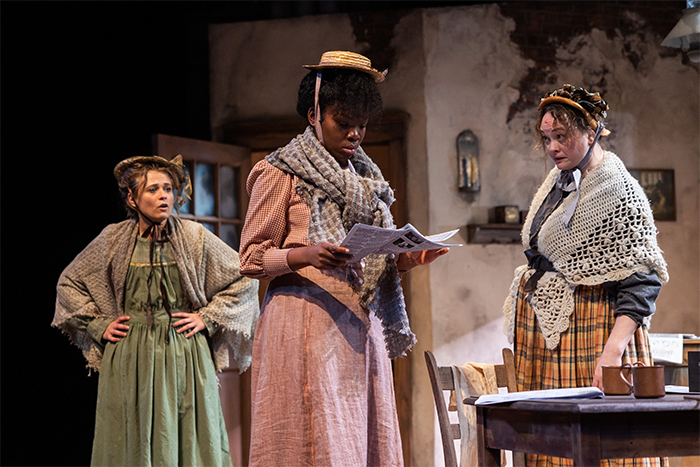
3 ⁄4
Skyler Sinclair, Rachel Omotoso and Melissa Pritchett in the Stages production of Maggie Lou Rader’s Let. Her. Rip, directed by Derek Charles Livingston. Photo by Melissa Taylor.
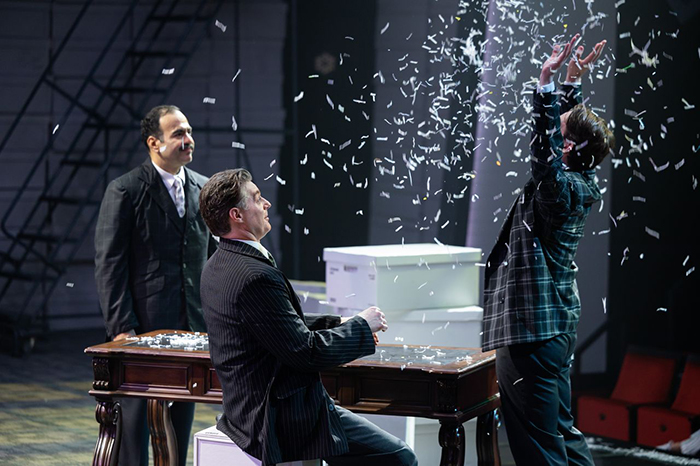
4 ⁄4
Spencer Plachy (Henry), Orlando Arriaga (Emmanuel), and Robby Matlock (Mayer) in the Stages Production of Stefano Massini’s The Lehman Trilogy, adapted by Ben Power and directed by Derek Charles. Photo by Melissa Taylor.
To satisfy audiences expectations for complex comic and dramatic contemporary works he’s programed Dominique Morisseau’s intergenerational story of sisterly relationships, Mud Row, and Lloyd Suh’s The Chinese Lady, inspired by the first Chinese woman in America.
“If you look at Stages’ history in the last couple of years, we have leaned very heavily into telling you multicultural, multi-ethnic, multiracial stories, as well. That definitely continues, but in a way that is edgier or funny.”
Even as one of the few theater companies in the country with three permanent stages, all three houses hold less than 300 seats, making them ideal spaces for shows that “demand people really lean in, pay attention and be willing to go on a journey,” says Livingston, using as an example the play Tiny Beautiful Things. This Nia Vardalos adaptation of Cheryl Strayed’s book chronicles her time as an advice columnist. Even an “epic” play, like the The Lehman Trilogy, which Livingston directed, and its truly American story of one immigrant family’s experience over a century, along with the rise and fall of the financial institution they built, can be rendered so immediate and vividly in Stages’ intimate spaces.
While they won’t be doing as many musicals this season as in the past, Livingston declares he loves the form. He remains committed to producing exceptional and perhaps unexpected ones, pointing to the parody musical Spamilton, that is as much about Lin-Manuel Miranda’s creative success as Hamilton the musical. Each performance will also include a second production, 21 Chump Street, written by Miranda and rarely produced because of its short length.
Finding inspiration from Stages history while moving into theatrical futures, Livingston has chosen the world premiere, that drive thru monterey for the spring. This is the first time they’re taking into full production a work previously workshopped during their annual play reading series, Sin Muros: A Latinx Theater Festival.
After a year of getting to know Houston and the theater community and with his acting, directing, and producing experience across the U.S., Livingston had several insights when I asked if Houston theater artists have similar qualities to artists in other cities. “Dedication” was his answer.
“The commitment to artistic excellence, the passion, is common,” he finds, but believes Houston’s uniqueness lies in its community sensibility, as artists work onstage and backstage in multiple theaters.
“They’re actors in Houston, and they work at the Alley. They work at 4th Wall. And they work at Stages,” he explains, adding “There is no class divide that keeps you only in one place.” Livingston will be participating in that collaborative artistic community himself, directing Fat Ham at 4th Wall in the spring.
“What is distinct [about Houston theater] is those actors are committed to being here and they can work at all levels. They can work in their hometown with an audience that knows them at various stages and different types of parts. And that’s really exciting.”
—TARRA GAINES

